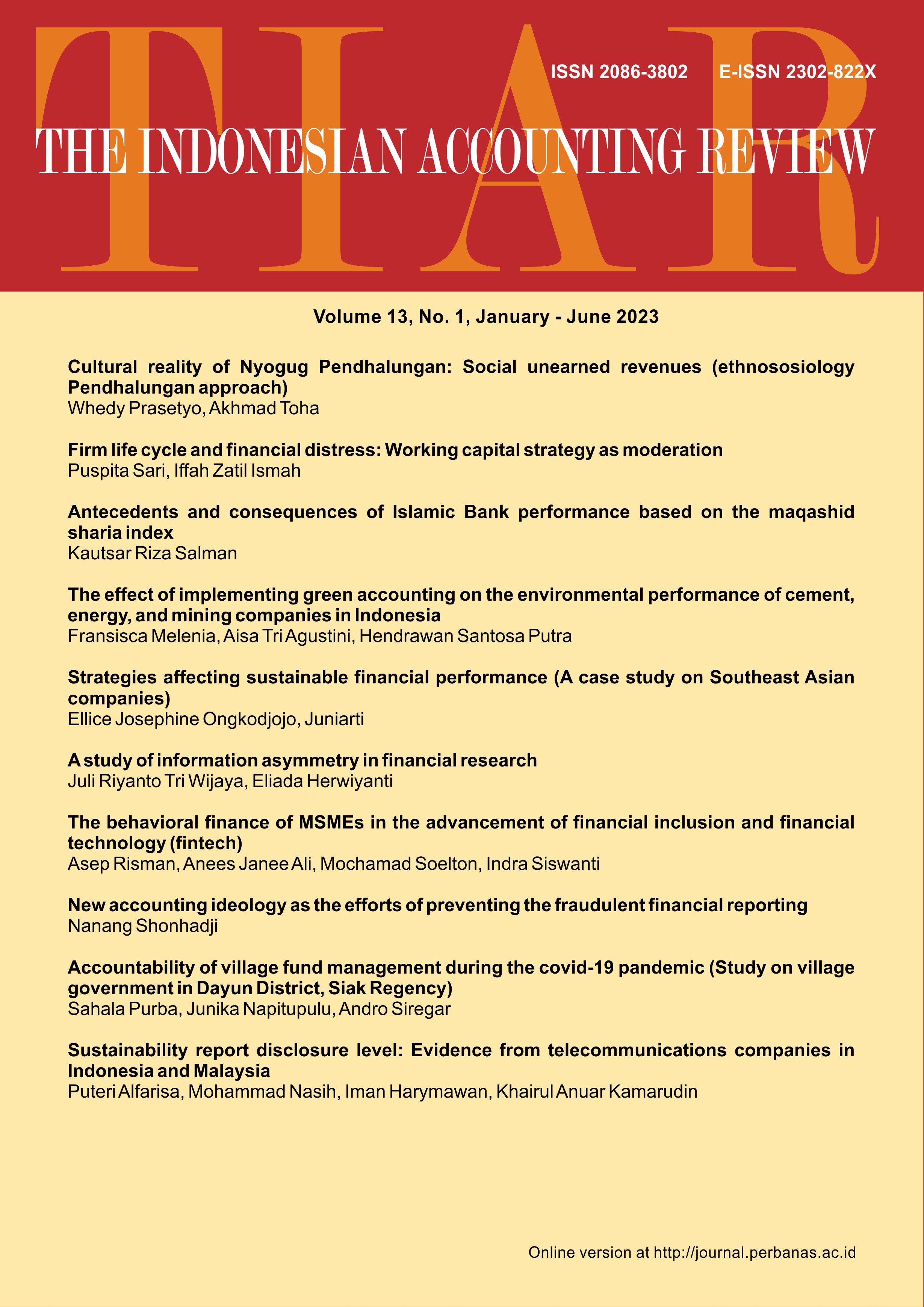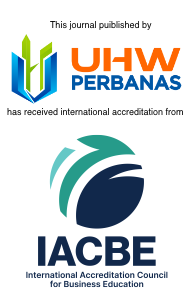Sustainability report disclosure level: evidence from telecommunications companies in indonesia and malaysia
DOI:
https://doi.org/10.14414/tiar.v13i1.2569Keywords:
Disclosure, Sustainability report, Glob-al reporting initiative, Telecommunications industryAbstract
This study investigates the disclosure level of sustainability report in telecommunication industry. This study specifically compares the disclosure level of companies in Indonesia and Malaysia using Global Reporting Initiative format template. The study compares the published reports between 2014 to 2016 periods. The results reveal that the disclosure level of sustainability reporting content for companies in both countries are in the intermediate level. Interestingly, our finding shows that companies in Indonesia disclose more content related to economy category. However, they disclose less on product-responsibility, environmental, and human rights categories compared to Malaysian companies. Furthermore, this study provides the investors an insight on how to monitor the disclosure level of the companies in both countries and highlight the demand of specific content to increase the contribution of the companies on specific sustainability issues.
References
Adams, C. A., & McNicholas, P. (2007). Making a Difference: Sustainability Reporting, Accountability and Organizational Change. Accounting, Auditing & Accountability Journal, 20(3), 382–402.
Al Farooque, O., & Ahulu, H. (2017). Determinants of social and economic reportings. International Journal of Accounting & Information Management, 25(2), 177–200. https://doi.org/10.1108/ijaim-01-2016-0003
Blasco, J. L., & King, A. (2017). The road ahead: The KPMG Survey of Corporate Responsibility Re-porting 2017. Retrieved from https://assets.kpmg/content/dam/kpmg/xx/pdf/2017/10/kpmg-survey-of-corporate-responsibility-reporting-2017.pdf
Boulouta, I., & Pitelis, C. N. (2014). Who needs CSR? The impact of corporate social responsi-bility on national competitiveness. Journal of Business Ethics, 119(3), 349–364.
Cahaya, F. R., & Hervina, R. (2019). Do human rights issues matter? An empirical analysis of Indone-sian companies’ reporting. Social Responsibility Journal, 15(2), 226–243. https://doi.org/10.1108/SRJ-10-2016-0171
Campos, L. M. D. S., Sehnem, S., Oliveira, M. D. A. S., Rossetto, A. M., Coelho, A. L. D. A. L., & Dalfovo, M. S. (2013). Sustainability report: pro-file of brazilian and foreign organizations ac-cording to the Global Reporting Initiative guide-lines. Gestão & Produção, 20(4), 913–926.
Deegan, C., Rankin, M., & Tobin, J. (2002). An Exam-ination of Corporate Social and Environmental Disclosures of BHP from 1983-1997: A Test of Legitimacy Theory. Accounting, Auditing & Ac-countability Journal, 15(3), 312–343.
Direktorat Jenderal Perundingan Perdagangan In-ternasional. (2017). G20. Retrieved June 11, 2019, from Direktorat Jenderal Perundingan Perdagangan Internasional website: http://ditjenppi.kemendag.go.id/index.php/apec-oi/organisasi-internasional/g20
GarcÃa, M. J., Turró, M., & Amat, O. (2014). The use of economic indicators from the Global Reporting Initiative by Spanish listed companies. Intangi-ble Capital, 10(4), 699–716. https://doi.org/10.3926/ic.550
Giannarakis, G., Sariannidis, N., & Litinas, N. (2011). An Analysis of Corporate Social Responsibility in the Greek Telecommunica-tions Sector. Global Business and Organizational Excellence, 30(4), 40–49. https://doi.org/10.1002/joe
GRI (2015). GRI G4 Guidelines Part 1 Reporting Principles and Standard Disclosures. Re-trieved June 3, 2019, from Global Reporting Ini-tiative website: https://www.globalreporting.org/resourcelibrary/GRIG4-Part1-Reporting-Principles-and-Standard-Disclosures.pdf
GRI. (2019). GRI Sustainability Disclosure Database. Retrieved April 29, 2019, from GRI website: https://database.globalreporting.org/search/
Haniffa, R. M., & Cooke, T. E. (2005). The impact of culture and governance on corporate social re-porting. Journal of Accounting and Public Policy, 24(5), 391–430. https://doi.org/10.1016/j.jaccpubpol.2005.06.001
Harymawan, I., Putra, F. K. G., Agni, T. D. K., & Kamarudin, K. A. (2020). Sustainability report practices in Indonesia: Context, policy, and readability. International Journal of Energy Economics and Policy, 10(3), 438–443. https://doi.org/10.32479/ijeep.8979
Kumar, T. (2012), Achieving Sustainable Develop-ment through Environment Accounting from the Global Perspective: Evidence from Bangla-desh. Asian Journal of Accounting Research, Vol. 2 No. 1, pp. 45-61. https://doi.org/10.1108/AJAR-2017-02-01-B005
Mendes, J. V., Oliveira, G. R., & De Souza Campos, L. M. (2019). The g-index: A sustainability report-ing assessment tool. International Journal of Sus-tainable Development and World Ecology, 1–11. https://doi.org/10.1080/13504509.2019.1589595
Mio, C. (2010). Corporate social reporting in Italian multi-utility companies: An empirical analysis. Corporate Social Responsibility and Environmental Management, 17(5), 247–271. https://doi.org/10.1002/csr.213
Nasih, M., Harymawan, I., Paramitasari, Y. I., & Handayani, A. (2019). Carbon Emissions, Firm Size, and Corporate Governance Structure: Evidence from the Mining and Agricultural In-dustries in Indonesia. Sustainability, 11(9), 2483.
Pangesti, R. D. (2017). Corporate Social Responsibil-ity dalam Pemikiran Budaya Jawa Berdimen-si “Hamemayu Hayuning Bawana†(Pendeka-tan Studi Hermeneutika). Jurnal Riset Akuntansi Dan Bisnis Airlangga, 2(2), 224–238.
Rao, K., & Tilt, C. (2016). Board diversity and CSR reporting: an Australian study. Meditari Ac-countancy Research, 24(2), 182–210.
Smit, A. M., & Van Zyl, J. (2016). Investigating the extent of sustainability reporting in the banking industry. Banks and Bank Systems, 11(4), 71–81. https://doi.org/10.21511/bbs.11(4).2016.07
Tsalis, T. A., Stylianou, M. S., & Nikolaou, I. E. (2018). Evaluating the quality of corporate social responsibility reports: The case of occupational health and safety disclosures. Safety Science, 109(November 2017), 313–323. https://doi.org/10.1016/j.ssci.2018.06.015
Downloads
Submitted
Published
How to Cite
Issue
Section
License
Copyright (c) 2022 The Indonesian Accounting Review

This work is licensed under a Creative Commons Attribution-NonCommercial 4.0 International License.

















